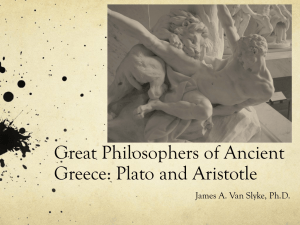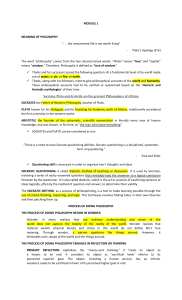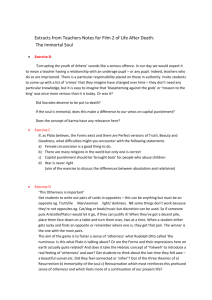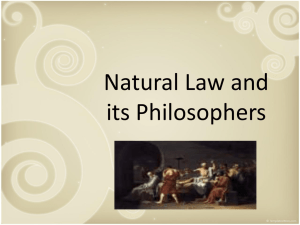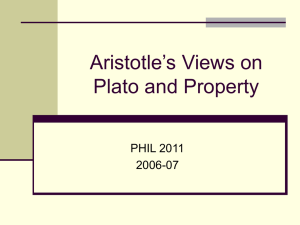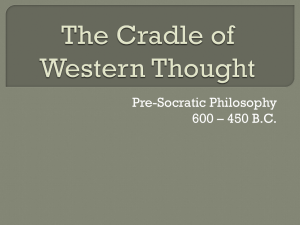Ancient Philosophy
advertisement
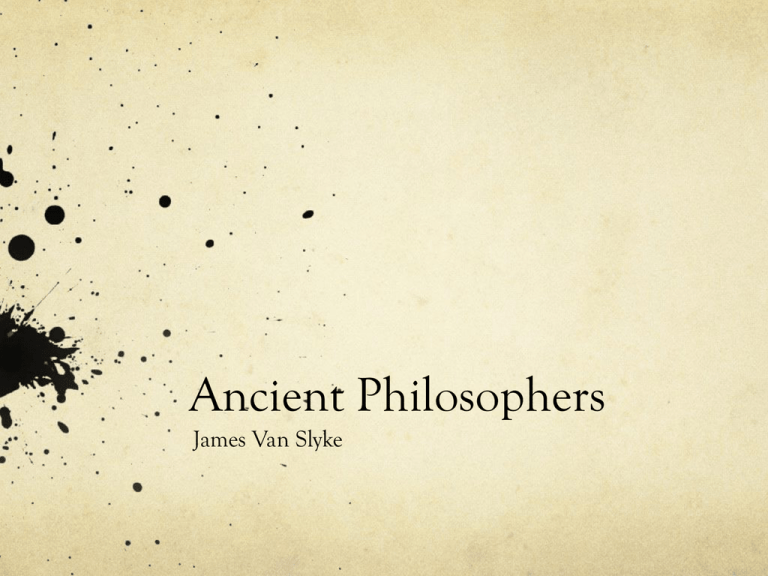
Ancient Philosophers James Van Slyke The beginning of philosophy… Ancient Greeks were the first philosophers 6th century BC Attempted to use reason to construct arguments about the nature of the universe Moved beyond mythology and religion (ancient Greek gods) seeking knowledge for its own sake The Milesians Thales Earliest forms of geometry and math Predicted a solar eclipse using reason Asked first metaphysical questions about the structure of the universe Political and Military advisor Anaximander Pupil of Thales Metaphysics based on the Infinite Pythagoras Founder of Geometry as a Systematic study Metaphysics based on souls inhabiting different forms of life Transmigration of the soul – souls migrates through different material forms of life – human souls are reincarnated Morality was based on the harmony of the soul Heracleitus Metaphysics of becoming rather than being Universe held together through the Great Logos Universe constructed through paradox divisible and indivisible Mortal and immortal Word and Eternity Universe in constant flux Zeno One of the first to use logical forms Constructed a series of paradoxes Paradox of Motion Argued that it was impossible to measure motion Legend claims that Zeno met Socrates at a festival in Athens ushering in the golden age of philosophy Democritus Theory of Atomism Matter is not infinitely divisible Smallest part of an object must have magnitude Matter is composed of tiny bodies (called atoms) Early form of Materialism Material substances are the only forms of existence Different objects are merely the aggregates of different combinations of atoms Rise of Greek Culture In 5th century BC, Athens becomes cultural landmark Rise in secularism Rise in Political theory and discussion Sophists Pragmatic use of philosophy Moved away from metaphysics to political and logical issues The Sophists Secularists Atheists Against the use of religion as persuasion Experts in the Art of Rhetoric Used logical arguments Offered education for a fee Philosophy became a commodity The Sophists Pragmatists Not interested in metaphysical speculation Skeptical about explanations of ultimate reality Egoism Life should be lived in the service of one’s own selfinterest This was the natural state of humanity Relativists Each person understands truth according to their own subjective understanding Reason is not objective Socrates Birth of the Golden Age of Philosophy First major figure associated with philosophy Rejected the extremes of speculative philosophy of the pre-Socratics and the cynical pragmaticism of the sophists Provided free instruction Developed the Socratic method of questioning Virtue is obtained through knowledge The Crito Plato recorded the words of Socrates in several dialogues It is difficult to know how much is fact and how much is idealization Socrates refuses to let his friends help him to escape The only life worthy living is a good life A life purchased through disobedience to the law is not a life worth living ‘Think not of life and children first, but think of justice’ ‘Let us fulfill the will of God and follow whither he leads’ The Phaedo Provides an account of Socrates last days and the nature of immortality and death A true philosopher does not fear death, nor will they seek to take their own life to avoid life’s hardships The body is a hindrance for the soul and the contemplation of knowledge, death frees the soul from its cage Various arguments for the existence of the soul The soul brings life Life is the opposite of death Therefore, death cannot overtake that which is immortal The Two Schools of philosophy Socrates’ student Plato and Plato’s student Aristotle formed two divergent schools of thought after the time of Socrates Plato set up his academy as an educational institution that taught both academics and political leaders In 367 B.C Aristotle at the age of 17 moved to Athens and studied at Plato’s academy for 20 years Aristotle later set up his own school, the Lyceum, which had many free lectures Theory or Common sense? Plato Pointing towards the sky Emphasized theoretical knowledge Clothed in red the volatile element of fire Aristotle Feet firmly on the ground Clothed in the colors of green (earth) and blue (water) Emphasized the empirical, what can be demonstrated and observed Plato Theory of Ideas Detailed treatment in the Timaeus The allegory of the cave Something must exist (the forms) that has a reality independent of the physical manifestation of things Forms – similar to a ratio or mathematical formula Concept or Essence of something Philosophy is concerned with the contemplation of ideas Cosmology based on a hierarchy forms Plato’s Cosmology Form of the Good Forms stars/planets = divinities humans animals plants inorganic material more order, goodness, beauty, less corruptibility as we go up the hierarchy Aristotle More interested in the empirical Classification of animal behavior Theories of causation Efficient causation – sculptor Material cause - stone Formal cause – forms Final cause – function something serves Expanded and reformed Plato’s thought Hylomorphic view of matter Form and matter work together; interdependent Aristotle Understanding of the soul Hierarchy of the soul Different types of souls provide different functions plants have vegetative/nutrition – about nutrient, reproductive, grow animals have animal/sensitive – sensation, locomotion, humans rational soul – intellect
